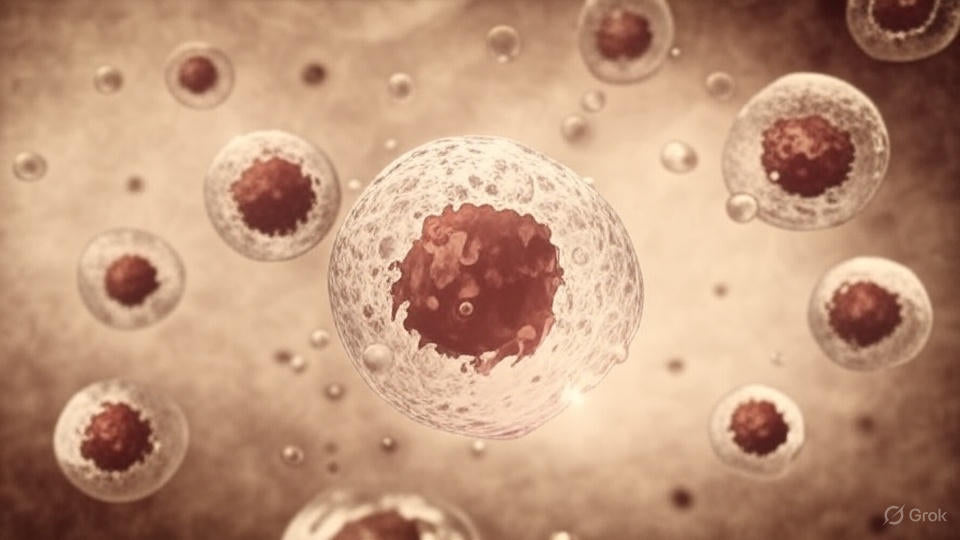Groundbreaking Study Shows Aging Could Be Reversed by Blocking HMGB1
Introduction
Aging has long been considered an unavoidable part of life, marked by gradual decline in tissue function and cell regeneration. However, a 2025 study published by a team of international scientists suggests that aging may not be entirely inevitable. The protein HMGB1, particularly in its reduced form (ReHMGB1), has been identified as a key factor that spreads age-related damage through the bloodstream. Blocking this protein in animal studies has shown remarkable results—damaged tissues started to repair themselves, and some age-related decline was reversed.
This finding could redefine how we understand aging and pave the way for revolutionary treatments targeting age-related diseases.
A groundbreaking medical study revealed that aging may be transmitted through the bloodstream via a protein called HMGB1. When researchers blocked this protein in animal tests, they observed remarkable results: damaged tissues began to repair themselves, and some age-related… pic.twitter.com/0nvop0Bgc9
— Massimo (@Rainmaker1973) October 5, 2025
How Aging Spreads Through Blood
Traditionally, aging was seen as a process of cellular wear and tear. Now, researchers show that aging signals are actively transmitted via blood. Senescent cells release molecules known as the senescence-associated secretory phenotype (SASP). Among these, ReHMGB1 acts as a “pro-aging” factor, binding to receptors like RAGE and activating pathways such as NF-κB and JAK/STAT, which promote inflammation and tissue deterioration.
In essence, ReHMGB1 accelerates systemic aging, creating a feedback loop that spreads cellular damage throughout the body.
How the Study Was Conducted
Researchers combined in vitro and in vivo experiments:
- Cell-Based Experiments: Human cells were exposed to ReHMGB1. Senescence markers like SA-β-gal staining, EdU incorporation, and gene expression analysis of p16INK4a and p21 were used to detect aging effects. RNA sequencing and cytokine arrays highlighted the activated inflammatory pathways.
- Animal Experiments: Young mice injected with ReHMGB1 developed widespread tissue senescence, mimicking natural aging. Middle-aged mice with muscle injuries were treated with anti-HMGB1 antibodies, resulting in reduced inflammation, improved tissue repair, and enhanced mobility.
Key Findings
- Aging Signal Propagation: ReHMGB1 spreads senescence through the bloodstream, impacting multiple organs.
- Reversal of Damage: Blocking HMGB1 decreased senescence markers, lowered inflammation, and improved regeneration.
- Therapeutic Potential: Targeting HMGB1 may offer treatments for age-related diseases like Alzheimer’s, arthritis, and organ failure.
These findings confirm that aging can be partially reversible and highlight HMGB1 as a promising therapeutic target.
Implications for Human Health
If similar effects are confirmed in humans, aging could be treated as a medical condition rather than an inevitable fate. Therapies could include:
- Drugs targeting HMGB1 to reduce systemic aging
- Lifestyle or natural compounds (e.g., curcumin, resveratrol) to lower HMGB1 activity indirectly
- Advanced regenerative treatments to repair tissue damage
The research also raises ethical considerations, including access equity and the societal impact of prolonged lifespans.
Frequently Asked Questions (FAQs)
- Q1: What is HMGB1?
- A: HMGB1 is a protein involved in cellular signaling. In its reduced form (ReHMGB1), it spreads age-related damage throughout the body.
- Q2: Can humans benefit from this discovery now?
- A: So far, the research has only been tested in animals. Scientists will need to conduct rigorous human trials before we can know if these findings are safe and effective for people.
- Q3: Does blocking HMGB1 stop aging completely?
- A: No, it may slow or partially reverse age-related damage, but aging is influenced by multiple factors.
- Q4: Are there natural ways to reduce HMGB1?
- A: Anti-inflammatory compounds like curcumin and resveratrol may help, but targeted therapies are more promising.
- Q5: Could this lead to longer lifespans?
- A: Potentially, but long-term studies are required to understand the effects on human longevity.
Conclusion
This groundbreaking study challenges the conventional view of aging as an inevitable, isolated process. The discovery that aging signals can spread through blood via ReHMGB1—and that blocking this protein can reverse some damage—opens the door to a new era in medicine. While practical applications in humans are still distant, the research signals a profound shift in our understanding of longevity, disease prevention, and the potential to extend healthy life. The study positions HMGB1 not just as a protein, but as a gateway to redefining aging itself—a possibility that could fundamentally transform human health and lifespan.


0 comments